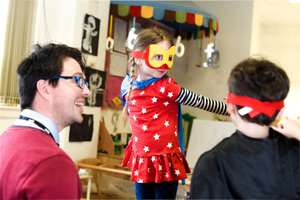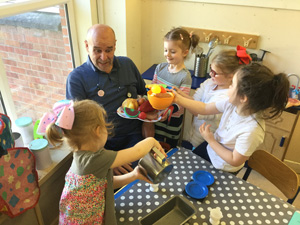SFC news published since 2018. See SFC archived content for earlier news articles.
Chris Palmer – Dumfries and Galloway College graduate and current student at the University of Glasgow writes about what it’s really like to be a male working in childcare.


Christopher Palmer, MA in Primary Education student, University of Glasgow
When I first entered the world of Early Learning and Childcare (ELC) sector, I was full of excitement of what my career would hold. However, I did have some reservations: I was 19 and it was my first time working away from my home town and I was a male, working in childcare? Is this right? Allowed?
It all seemed pretty scary. But 11 years on, I am still in the ELC sector and I can honestly say that it was one of the best decisions of my life.
However, it seems that the ELC sector are still somewhat struggling to attract males to fulfil roles such as nursery nurses, learning assistants and teachers (amongst others). Why is this the case? Why do men still hold reservations about working in ELC?
I feel men should be encouraged to work in child development roles and should have no fear if they are thinking of joining the ELC sector. The easiest and clearest way of explaining how is by detailing the positives and negatives of men working in childcare and thereby showing that in my experience, it’s a case of perception vs reality (P vs R).
Perception: “Parents do not want men working with their young children.”
Reality: In my experience; parents not only support the idea of men looking after their children, they prefer it! When working as a play worker, parents would arrive at the nursery and ask if I could be assigned as their child’s key worker. This happened fairly regularly.
Putting my ability of being a play worker to one side, the main reason was that a section of the children who were in the care of the nursery had “no real” male role model within their family dynamic.
Having men working in ELC settings provides this option. Males can fulfil a potential void in a child’s life. From an early age, it is important that children have people they look up to and aspire to be and men working in ELC roles can be the positive male role model that the child may not have at home.
Perception: “ELC staff do not want men working within their setting.”
Reality: Again, in my experience, this is simply not the case.
I have worked in various settings around the UK and Europe and I can say that the overriding thought of ELC staff it that more men working in ELC settings is a good thing. Female staff have expressed that “more men working in ELC would ensure a more complete and well-rounded delivery of childcare.” And “Children who play rough and tumble play and football (and other activities) at home with their Dad love to see a male in the setting as that experience can be experienced at nursery too. This positive experience can be used as a learning tool (e.g. using footballs as planets when teaching science).
Perception: “Working in Early Years and Childcare settings is a job for females.”
Reality: In my opinion, this is the obstacle that we as a society must overcome. I feel that being an effective and stimulating ELC staff member requires a certain skill set and personal characteristics. It has nothing to do with gender.
Enthusiasm, caring, patience, imagination, organisation and the drive to be a positive influence on a child’s life is not a matter of gender, but a mindset.
This list is not exhaustive. People of all genders are able to fulfil these roles.
Finally,
Why should males specifically work in ELC settings?
My answer is three-pronged.
- As previously discussed, out of the hundreds of people I have worked with over the past 11 years have expressed the view that having men working in ELC settings is extremely beneficial to fulfilling the needs of all children.
- Having more men in ELC settings would provide children with a more accurate split of the world’s population as a whole. If a child at nursery or school interacts with 10 people on average per day and only 1 of those is male, the child could easily think that there’s 10 times more females on the planet than males.
- Breaking gender stereotypes is key to role equality within the ELC sector. A class discussion of what their parents do for work may lead to “which jobs are for men and women?”. If a child puts up their hand and tells the teacher that “being a teacher is a girl’s job” and out of the 30 teachers in the school, 2 of them are male, how are we to argue this is not the case?
In 2007, my ELC career started. I was unsure if as a male, I would be valued and welcomed within the ELC community. I can say without question that this has been the case.
Working in the ELC sector is one of the most rewarding jobs you can do. Being a part of a child’s young life and watching them grow and learn is an experience I urge all men to join the ELC community and experience it.
You won’t regret it.
Other perspectives:

David Harvie, Ayrshire College graduate
“I was managing a Virgin MegaStore, when my first son was born. The chance to change career came along when Virgin were closing down, and I saw this as an opportunity to go and get the career that I wanted.
That’s when I first thought of working in Early Years, so I went to study HNC Early Years at the Ayr campus.
After finishing college, I worked at a private nursery in Prestwick, and left there to work as a supply Early Years Practitioner for various different schools, before I came to Dundonald Nursery four years ago.
There’s no average day working in Early Years, every day is different! We try to allow things to be child-led, letting them choose what they’d like to do. We have our outdoor policy, where the door is always open. I’d say more than half of the children want to be outside at any one time. We are out in all weathers and the children really enjoy it.
As far as jobs go, it’s a lot of fun. Spending time with the children is brilliant. One of the more rewarding aspects of the job, is getting to see the progression that they are making. The fact that the staff in the nursery are helping them to get there, I don’t think there’s many jobs like it. It’s also good to see the children progress on to primary school, and it’s nice being able to keep up with how they are doing at the school too.

Charlie Friel, West College Scotland graduate
I love my job. It is physically and intellectually demanding, but I go to work each day with a spring in my step. As an early years professional, you will be helping very young children to become confident people, eager to learn and to contribute to their society while they pursue their share of happiness, and overcome life’s obstacles.
If this sounds like a big task, it is. But it is achieved by havinga lot of fun with the children along the way. As well as my interesting diet, I have been glued to a chair, become a Zombie and a robot, discussed global warming with a four year old child, and been shown the best way to negotiate a ‘laser beam’ obstacle course (slow and steady, it seems).
Then what is it that is holding men back? It isn’t female colleagues. They couldn’t be more welcoming. It certainly isn’t the children. Their only concern is that they can have fun with you. It isn’t the parents and relatives, although there is still some resistance to men working with the under-twos. It is men themselves that are the problem, as a recent survey in Nursery World showed. Too many of us are keeping outdated stereotypes going. Men do make good carers. Not all of us, of course. But then, many women are better physicists or firefighters than I could ever hope to be.
So come on, lads. Whether you are leaving school or, as I did, are considering a career change, think about early years work, because it is a rewarding and fulfilling career, and around 50% of the population is missing out.
A new £50,000 challenge fund aimed at increasing the number of men working in early learning and childcare (ELC) has been announced by Maree Todd, Minister for Children and Young People.

